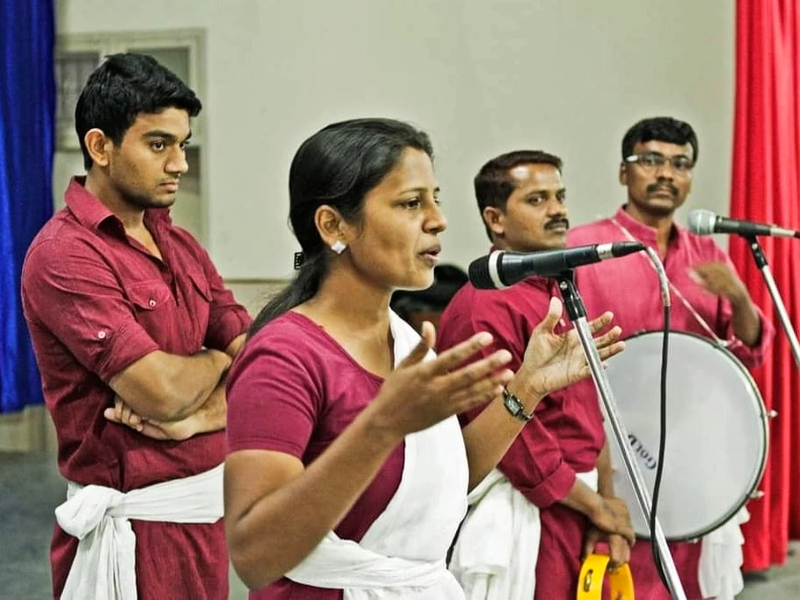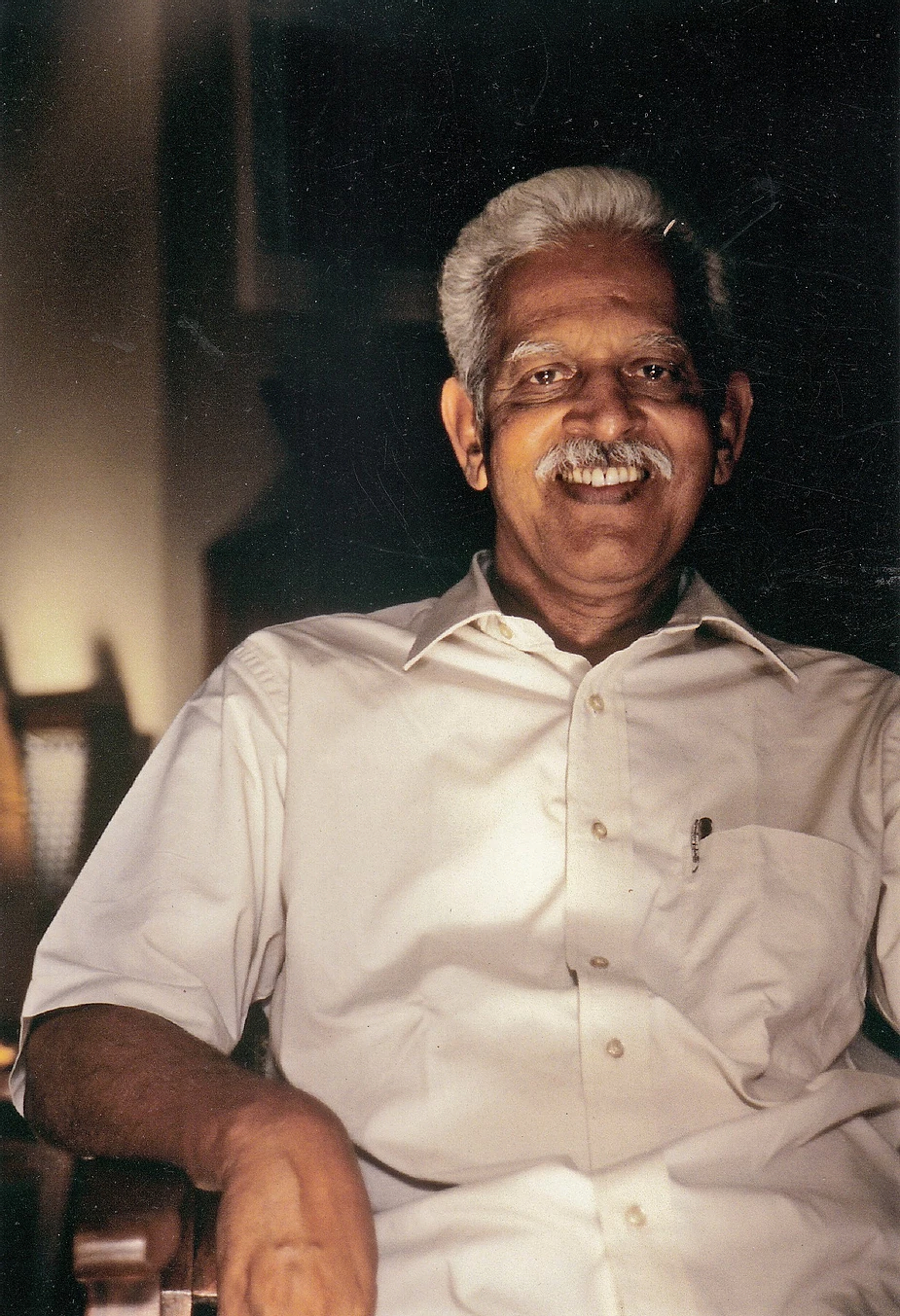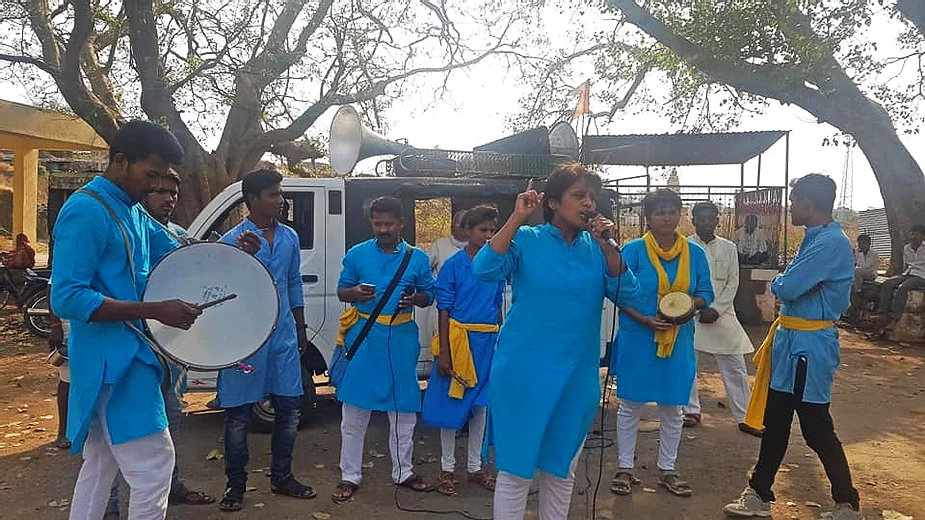
Mumbai: “You can counsel the other inmates in jail. That way your time inside won’t be wasted.”
With these words, Rupali Jadhav bid farewell to her Kabir Kala Manch (KKM) colleague Jyoti Jagtap in the Pune office of the Maharashtra Anti-Terrorism Squad (ATS) on 8 September 2020. The ATS arrested 33-year-old Jagtap that morning, stopping her Splendor motorcycle at a traffic signal while she was on her way to meet Jadhav. The two friends had planned to meet at noon. At 12.45 pm, Jadhav got a call from the ATS asking her to collect her friend’s motorcycle and belongings.
On 9 October 2020, the NIA filed a 10,000-page supplementary chargesheet accusing Jagtap and the others of inciting violence and promoting communal enmity, “giving provocative presentations and speeches’’, and said that they have links to the banned Communist Party of India (Maoist). What was missing from the chargesheet was the original accusation made against the first five accused in November 2018 by the Pune Police: that they were plotting to kill Prime Minister Narendra Modi.
The accused—the latest to be arrested is 83-year-old Stan Swamy, a Jesuit priest from Jharkhand—are charged under 10 sections of the Indian Penal Code, 1860, and the Unlawful Activities Prevention Act, 1967 (UAPA), whose legal processes, as a July 2020 Article 14 analysis showed, render a person’s guilt or innocence irrelevant.
An MA in psychology from Sir Parashurambhau College, Pune, Jagtap—currently being held in Mumbai’s Byculla Jail—was also doing a course in advanced counseling and Rational Emotive Behaviour Therapy from a private institute in Pune, after which she had planned to open a clinic.
In the 9 October chargesheet, the NIA described Jagtap and two fellow artistes previously arrested as “trained cadre of the CPI (Maoist) who attended meetings to organise the Elgar Parishad”, a protest meeting held nearly three years ago in Pune.
Jagtap’s lawyer Susan Abraham said that the only role ascribed to Jagtap was that she was part of a performance at the Elgar Parishad. In statements made by approvers recorded by the NIA before a magistrate, Jagtap has also been accused of having received training from Maoists “in the jungles”.
‘Smash The New Peshwai’
Jagtap, who joined the Kabir Kala Manch in 2007 as a 20-year-old, is the third member of the Manch to be arrested in the Bhima Koregaon case.
The case relates to the violence that broke out at Bhima-Koregaon, where thousands of Dalits had gathered on 1 January 2018 to commemorate the 200th anniversary of the battle fought there between the British and the Peshwas.
It was here that 500 Mahars (a scheduled caste) helped the British defeat the Peshwas. Ever since Dr B R Ambedkar first paid homage in 1927 to the victory memorial built by the British, Dalits gather there on 1 January every year.
On 1 January 2018, Dalits making their way to the site faced stone throwing by mobs carrying saffron flags, according to testimonies of witnesses and victims to a two-member judicial inquiry commission set up to investigate the violence. The violence later degenerated into clashes, the properties of non-Dalits were attacked and a man died.
A day before the 1 January 2018 celebration, the Kabir Kala Manch, a cultural troupe that has taken its message of social justice across Maharashtra for the last 18 years, had performed at the Elgar Parishad held on 31 December, 2017 in Shaniwar Wada, Pune.
A protest rally, organized by two retired judges, P B Samant and B G Kolse Patil, with the help of Dalit and Left groups, the Parishad saw the Shanivar Wada grounds overflowing, with the crowds numbering around 35,000.
The chorus of this song recurs in an FIR filed by the Pune police eight days after the event:
Bhima Koregaon ne dila dhada/
Navi Peshwai Masnat Gaada/
Udaava Thikrya Rai Rai Re/
Gaadun Taakwa Peshwai Re/
Garjna Sidnakachi/Aali Navi Peshwai Re/
Garaj Tila Thokyachee Re/Sainika Garaj Tila Thokyachee
(Bhima Koregaon has taught us a lesson/ Bury the New Peshwai/Blow the Peshwai to smithereens/and bury it/Roars Sidnak/ The New Peshwai has come/The need is to smash it/Soldiers, the need is to smash it)
The complainant, Tushar Ramesh Damgude, who described himself in the FIR as a builder (“Occupation – reconstruction’’) but is a self-professed admirer of Hindutva leader Sambhaji Bhide, alleged in his complaint that Jyoti Jagtap, Sagar Ghorkhe and Ramesh Ghaichor, all members of the Kabir Kala Manch, spread “malice and enmity” through this song.
Introducing The ‘Naxal’ Label
The FIR also mentioned speeches made by Dalit activist Sudhir Dhawale and “provocative slogans” raised there. All these, according to the FIR, resulted in caste clashes at Bhima Koregaon on 1 January, 2018.
The FIR alleged that the banned Communist Party of India (Maoist) had an “organizational” role in this event, and all this was done to spread “Maoist ideologies among the depressed class and misguide and turn them towards unconstitutional violent activities.”
It is on the basis of this FIR that the arrests of 16 intellectuals, lawyers and activists have taken place since June 2018.
Like her two colleagues of the KKM, Jagtap too has been charged with, among other things, sedition, waging war against the government of india, promoting enmity between two sections, criminal conspiracy and terrorism-related sections of the UAPA.
On 8 September, the day they arrested Jagtap, the NIA issued a statement calling the Kabir Kala Manch “a frontal organization of banned terrorist organization CPI (Maoist).” The same description was used by the Pune police for the Indian Association of People’s Lawyers (IAPL) of which three of the Bhima Koregaon accused (Surendra Gadling, Sudha Bharadwaj and Arun Ferreira) are members. Ferreira’s lawyer Sandeep Pasbola had argued in court that the police had no basis to reach this conclusion, since there was no material to substantiate their accusations.
Analysing the judgment convicting Delhi University Prof G N Saibaba of links with Maoists, lawyer Gautam Bhatia wrote that “there was no provision in law for declaring an organisation to be a frontal organisation”.
The NIA further said that the three KKM members “were propagating Naxal activities and Maoist ideology and were a co-conspirators (sic) with other arrested accused.’’
In an interview to a Marathi news channel before the event, Jagtap explained the rationale behind the Elgar Parishad event. “Basically the situation has become horrific in the last three-four years. Manuwadi thinking has once again become stronger since (they) have come to power. Caste and religious enmity are increasing on a large scale,” she said. “So about 200-250 organisations active in Maharashtra felt they should come under one banner and show their resistance in an organised manner. These organisations have come together under a front named Bhima Koregaon Shaurya Din Prerna Abhiyan. They will be holding an Elgar Parishad at Shaniwar Wada.”
Jagtap’s arrest follows the pattern of staggered arrests in the Bhima-Koregaon case so far, with the first set of arrests taking place over two years ago in June 2018 and a trial yet to begin. All the accused who have moved for bail in this period, such as the human rights lawyer and teacher Sudha Bharadwaj and the poet Varavara Rao, have been denied it. On 22 October, Father Stan Swamy’s application for bail on medical grounds was rejected.

Senior advocate Mihir Desai, who represents some of the accused in the Bombay High Court, told Article 14 that this tactic of staggering arrests “helps protract the trial so that the accused can be kept inside the jail for as long as possible”.
Why Were The Activists Arrested?
But this is not the only FIR relating to the violence that erupted at Bhima Koregaon. A previous FIR was filed immediately after the violence, on 2 January, by activist Anita Sawale, who had visited Bhima Koregaon. Sawale blamed Hindutva leaders Sambhaji Bhide and Milind Ekbote for the violence.
On the basis of this FIR, Ekbote was arrested after the Supreme Court rejected his anticipatory bail and is currently out on bail. Bhide was never arrested; then CM Devendra Fadnavis gave him a clean chit in the Assembly.
On 26 March 2018, Bharip Bahujan Mahasangh leader Prakash Ambedkar led a 20,000-strong march in Mumbai demanding the arrest of Bhide. On 18 April 2018, the homes of three KKM artists, including Jagtap, were raided by the Pune police. In June, the first five arrests in the case took place.

Jagtap had then linked the arrests to the demand that Bhide be booked. “This seems to be a premeditated conspiracy on the part of the BJP government and the forces of law,” she had said. “Ambedkarite activists are arrested more than six months after the Bhima-Koregaon violence because they demanded the arrest of Hindutva leader Sambhaji Bhide ‘Guruji’, who is the prime accused in the January 1 riots.’’
‘All We Do Is Sing’
The Kabir Kala Manch was founded in Pune by a group of young people in the wake of the 2002 Gujarat riots. They sang in Pune’s bastis against Hindutva, casteism, inequality and state brutality against the poor and in praise of Ambedkar’s teachings.
In the words of S Anand, editor of Navayana, their “lyrics …fused Ambedkar with radical Left’’.
With the fame that came with Patwardhan’s documentary, came police scrutiny.
In 2011, the first arrests were made of KKM members Deepak Dhengale and Siddarth Bhosale. Their arrests prompted others in the troupe, including Jyoti Jagtap, to go underground. A Kabir Kala Manch defense committee was formed in 2012 headed by Patwardhan and supported by intellectuals such as veteran socialist Bhai Vaidya and actress Ratna Pathak Shah.
After Dhengale and Bhosale got bail in January 2013, in a judgment by Justice A M Thipsay that said it was no crime either to be attracted to communist ideology or to express the desire for social change, and that the charge of being members of the CPI (Maoist) had not been proved, those underground presented themselves to the authorities in two batches. Jagtap, who came overground in April 2013, was not arrested.
Police surveillance on the troupe, that started in 2011, has never slackened.
“All we do is sing. A song is nothing concrete. So it must be the energising force that our songs have that rattles the police,’’ says 34-year-old Rupali Jadhav, who joined the Manch in 2009.
“We perform wherever there is injustice; our performances against Lavasa, for instance, drew tremendous response,” said Jadhav. “Since we are not part of any party, we are a soft target.’’
“They would discuss with me their difficulties and sorrows. They wouldn’t have even a paisa on them for food, forget clothes,” said Kolse Patil. “Yet, on stage, they betrayed nothing of this. I don’t know from where they get this spirit. Their opposition to this government is ideological; they speak against manuwaad and money-waad. But that’s not tolerated by this government.’’
Holding The Troupe Together
In 2013, with three KKM members in jail under the UAPA, and the rest under the police’s scanner, the troupe could easily have disintegrated. Perennially short of funds, they found their avenues of performance drying up, thanks to the police threatening whoever invited them.
It was under such circumstances that Siddarth Bhosale, Deepak Dhengale, Rupali Jadhav and Jyoti Jagtap ensured that the Manch stayed alive. According to Dhengale, it was Jagtap who was the most determined to keep the Manch going.
Until now, Jagtap had remained part of the chorus, not a lead singer. Her talent lay elsewhere: in writing and directing plays, recalled Jadhav and Dhengale. She was also an effective narrator (see here and here), introducing the troupe to the audience, asking the audience questions.
“Her slightly husky voice and her not-quite-urban accent helped build a rapport with rural audiences,” said award-winning writer and translator Milind Champanerkar.
The changed situation in 2013 however, forced her to take a lead role in KKM performances. As it is, Jadhav said, Jagtap had innate leadership qualities. “Her body language showed her confidence,” said Jadhav. “We women tend to deflect to men on occasion, thinking they can handle some things better. Jyoti never did that.”
Champanerkar recalled her playing the sutradhar (narrator) in a Vaganatya tamasha performance, a role traditionally played only by men. At a late night performance in a remote village in Parbhani district, the lights suddenly went off. “But Jyoti didn’t hesitate even for a minute,” recalled Champanerkar.
When the troupe performed at the Film and Television Institute of India (FTII) in August 2013 (a performance that ended in violence), Jagtap introduced them with these words: “We are not trained musicians from the Gwalior gharana, or the Jaipur or Agra gharanas. We are working class youth from the basti, factory and farm-labour gharanas. We won’t be able to deliver the perfect note or play the perfect instrument but if you listen to our words, I am confident that what we have to say will be of interest.”
This introduction revealed how far Jagtap had travelled as a member of Kabir Kala Manch.
Learning The Language Of The People
When she joined the cultural troupe in 2007, Jagtap had traditional notions of what constituted art.
As she told Aritra Bhattacharya, who is researching cultural movements in Maharashtra: “In KKM, I saw for the first time that you could say such beautiful things in the language of the common masses. And that you must speak in the language of the common masses…When I had gone on stage for the first time…I wondered do these songs really get a response…Then I saw, yes, this (is the) people’s voice.’’
Jagtap joined the Rashtra Seva Dal—a youth organisation founded in 1941 by Socialist freedom fighters Sane Guruji and S M Joshi among others —as a teenager, attracted by the issues of gender and secularism they took up and the street plays they performed, she told Bhattacharya. She was also moulded by the liberal and egalitarian way in which she was raised by her father, a Mumbai mill worker who returned to his village Belsar near Jejuri to take up farming.
When Jagtap joined KKM in 2007, she had already been part of student agitations, taking up issues of buses for students and women’s rights. What the Manch opened her eyes to, she told Bhattacharya, were two things: urban slums, where KKM members lived and which she had never seen; and the phenomenon of caste, which as a Mali (designated as an Other Backward Class group) she had not experienced. Nor had the Rashtra Seva Dal ever discussed it.
“When I came to KKM, I heard them talking about caste, and I wondered: Why are they talking about something that is thousands of years old!”
Till then, Jagtap knew B R Ambedkar only as the author of the Constitution and a leader of Mahars. But her reading of ‘States and Minorities’ by Ambedkar convinced her that he was the ideologue she had to follow, she told Bhattacharya.
That process, according to her colleagues, was typical of Jagtap. “Studious’’ was the word used most frequently by Dhengale to describe his young colleague. “She would not just read, but encourage us to do so too,’’ he recalled. “She was serious, not one to spend time laughing and chatting.’’
It was Jagtap who fielded queries about the Manch’s split, which occurred soon after its members were released on bail in January 2017.
“Jyoti was obsessed with using every minute of her time productively,’’ recalled Jadhav. Hence Jadhav’s parting message to her colleague just before she was taken away by the police: “Don’t worry, you can counsel prisoners in jail, you won’t be wasting your time.’’
Of all the KKM artistes, Jagtap was the most reserved and academically inclined, said Bhattacharya. Conducting and attending talks, and interacting with academics was her forte, he recalled.
The difference in their personalities, said Jadhav, is the reason she describes their relationship as “comradeship’’. Despite the years they spent together under the most trying of circumstances, whether underground or in villages in Marathwada campaigning for Prakash Ambedkar’s political party, the Bahujan Vanchit Aghadi during the 2019 Lok Sabha polls (Kabir Kala Manch decided as a group to support Ambedkar’s party; he neither responded to calls nor messages by this writer after Jagtap’s arrest), they were not “saheliyaan”, said Jadhav.
“We shared a comradeship; we weren’t friends the way girls are,’’ she said. “I had my own friends. But as comrades, we were there for each other any time of the night or day.’’ It was Jadhav’s phone number that Jagtap gave to the ATS when they arrested her on 8 September.
Jagtap would never have given the police the phone number of any of her family, because, according to Dhengale and Jadhav, she never wanted them to be affected by her activism. “They are village folk,” said Dhengali. “For them a visit by the police would be a scandal and a shame.’’
Did she cry, when Jadhav last met her, at the prospect of imprisonment?
“Cry?” asked Jadhav incredulously. “We are way beyond crying now. We knew when we started exposing the system, the state was going to come after us. We also know we’ve done nothing wrong, never advocated anything beyond the constitution.’’




